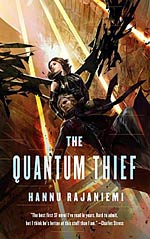
![]() Triseult
Triseult
3/1/2013
![]()
The Quantum Thief is post-Singularity transhumanism going on a Technicolor wire-fu wall-to-wall swashbuckling adventure. It's post-humanity finally letting its hair down for a bit of fun.
Quantum Thief reminded me of a lot of my favorite SF settings, and mostly in a positive light. There's something of the French bande dessinée SF masterworks on display here, most notably Jean Giraud or, one of my favorites, Godard and Ribera's The Vagabond of Limbo. The city of Oubliette is a rejoinder to other great modern SF tales, Perdido Street Station with a dash of The City and the City.
I've always wondered how a Medieval monk would feel if being dropped in the middle of contemporary life with its cellphones and high-speed Internet. Having read Quantum Thief I have a better idea. Rajaniemi drops the readers into his outlandish world without map nor compass, and it takes a good hundred pages to get your bearings and start making sense of the world. It's a great trick, actually; for the first half of the book, Quantum Thief's universe feels fresh, able to make you gasp at a new concept that just sneaked up on you while you were being distracted by the larger-than-life characters.
A lot of reviewers describe this work as "difficult" because of the lack of exposition early in the novel. I disagree. Yes, it's a bit disorienting at first, but the plot and structure themselves are fairly straightforward. The setting comes into focus quickly, and once you grasp some of the most arcane and exciting concepts, the novel becomes a lot more familiar in its progression and tone.
The characters are all fairly well-drawn and exciting. They act like they were sucked out of an Alexandre Dumas novel and given cybernetic implants. The French flair of the setting and names was a nice touch. Their overall motivations are well-drawn, but unfortunately, they tend to get lost in the grandiose complexities of the setting.
And this is where Quantum Thief falls short of perfection: it dwells so much into the intricacies and gear work of its setting, but remains steadfast in its allergy to exposition. The result is a lot of character actions that only appear motivated by the workings of the world, but are ultimately unconvincing. For instance, we get to watch Jean le Flambeur perform a high-stake heist, but the complex, alien operations required by the setting robs us of an opportunity to marvel at his cleverness. Instead, we get a bit of exposition that implies that whatever tortuous Time manipulation that just took place was the result of brilliance, not plot convenience. We're left having to trust the author when he tells us his characters are acting in a coherent manner.
Finally, some parts of the setting pulled me out of immersion, instead of reinforcing it. Mr. Rajaniemi has a tendency to reference contemporary times, which is a puzzling decision considering how remote his world is from our own. In a chapter written from the point of view of a Martian native, we are told a certain vehicle looks something out of War of the Worlds. There are also a lot of tongue-in-cheek references to MMOs, up to and including the word 'epic mount', which pulled me right out of the story. These remind me that I'm just reading a book, and although it may be true, it's not a good thing.
But these are mostly just quibbles. This novel is the most exciting that post-humanism has felt in a long, long time, and the first half of the book was a dazzling, breathtaking roller-coaster ride. Kudos to Rajaniemi for pulling all the stops and trusting the readers to just hold down their lunch and whoop for joy.